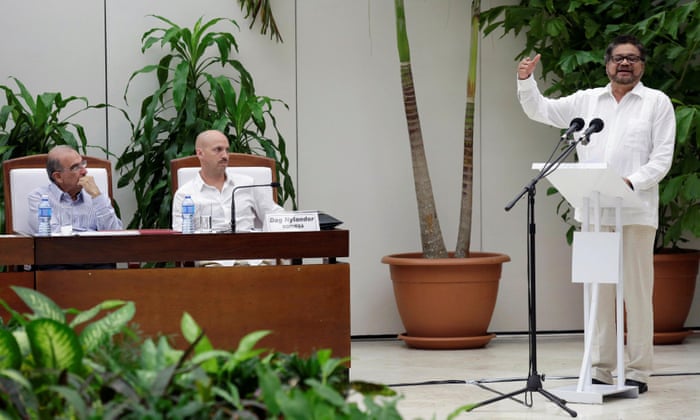Colombian government and Farc reach new peace deal
Modifications to original accord, rejected in a plebiscite, aim to win round no vote but arguments have already begun

Farc lead negotiator Ivan Marquez addresses the audience while Colombia’s lead government negotiator Humberto de la Calle and mediator Dag Nylander of Norway look on. Photograph: Enrique de la Osa/Reuters
A new peace deal reached between the Colombian government and leftist Farcguerrillas aims to broaden support after voters last month narrowly rejected an original accord to end more than 50 years of conflict.
Government and rebel negotiators announced late on Saturday in Havana that they had agreed on a host of modifications to the original deal, taking into account objections from different sectors of society that campaigned against it, led by former rightwing president Álvaro Uribe.
“We have reached a new final accord to end the armed conflict that integrates changes, precisions and proposals suggested by the most diverse sectors of society,” the two sides said in a statement.
The government, which had insisted that the first agreement was the “best deal possible”, admitted it had improved. “I humbly recognise that this agreement is better,” Humberto de la Calle, the government’s chief negotiator, said.
“We understood the importance of reformulating [the agreement] with a broader consensus that incorporates many voices that were absent during the negotiating process,” said Iván Márquez, the Farc lead negotiator.
Colombian voters rejected that deal in a plebiscite on 2 October, sending negotiators back to the drawing board.
Although the text of the new agreement was not immediately published, the president, Juan Manuel Santos, laid out certain changes in a televised speech. Some are little more than clarifications of the often-vague language of the text. Other modifications are more substantial.
Under the new agreement, Farc commits to declare and hand over all their assets, which will be used for reparations to victims of the conflict, a provision not included in the first accord and demanded by leaders of the no vote.
Many Colombians who rejected the deal said they did so because they wanted to see guerrillas behind bars for the thousands of kidnappings and killings they were responsible for. The new agreement does not include jail time for former rebels but better defines the kinds of alternative punishment they will face under a special tribunal that will prosecute war crimes, according to Santos.
Critics had also balked at the idea of convicted criminals being able to hold public office. That provision remains unaltered in the new deal. Santos defended the issue.
“The reason for all peace processes in the world is precisely so that guerrillas leave their arms and can participate in politics legally,” he said.
It is not clear whether Santos will risk a new plebiscite to ratify the agreement or ask congress to approve it but even before the new text was published critics tweeted their objections.
“The new agreement continues to include Farc members of congress who don’t need votes to be elected. Absurd and unacceptable,” tweeted Vanesa Vallejo.
Nuevo acuerdo sigue contemplando congresistas de las FARC que no necesitan votos para ser elegidos. Absurdo e inaceptable.
Political analyst Ramiro Bejarano said the continued criticism from those who have opposed the peace process was predictable. “Their strategy is to torpedo peace,” he tweeted.
Partidarios del NO saldrán a decir, sin haber leído, que este nuevo Acuerdo con FARC no les gusta.Su estrategia es torpedear la paz.Lo verán
On congratulating Colombia on the new deal as an “important step forward”, US secretary of state John Kerry said continued dissent was understandable.
“After 52 years of war, no peace agreement can satisfy everyone in every detail,” he said in a statement.
Uribe, who championed the no vote in the referendum, did not immediately react to the new accord other than to say it should be open to review.



